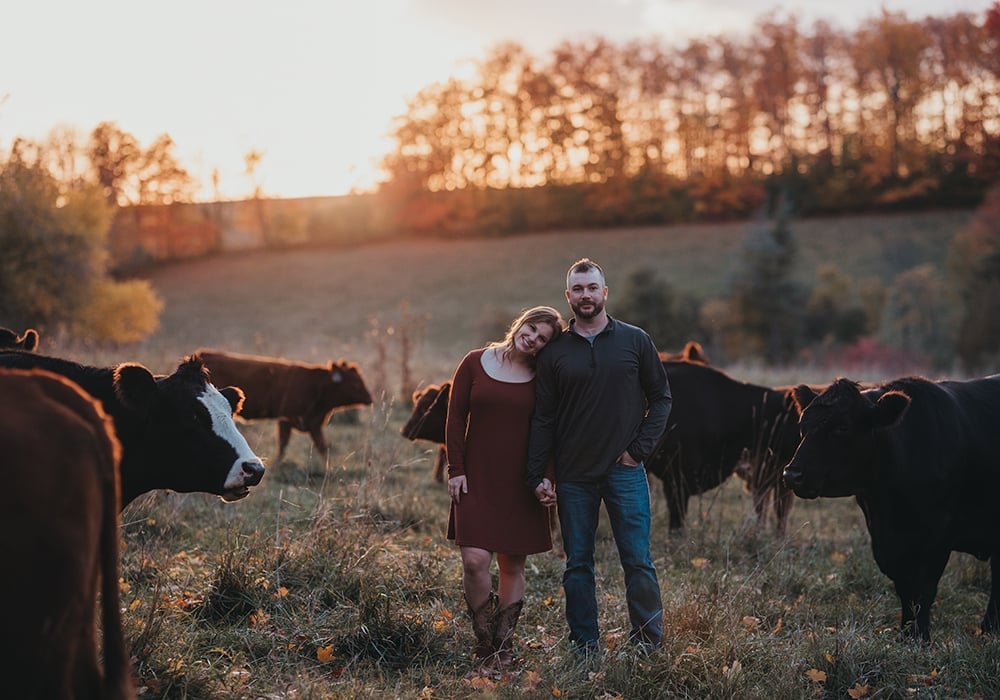Fed-up Ontario farmer seeks move to Prairies

Glacier FarmMedia – Rob Glover is done with Ontario.
Read Also

New on-demand video series for succession planning
A new, on-demand video training series to help farmers with succession planning has been launched by Loft32. Farmers’ Bridge…
The 33-year old would like to own and operate a farm near his hometown of Peterborough, but the math doesn’t make sense. To purchase 100 acres and run a small herd of beef cattle, the price tag for the land could be $1.5 to $2 million or more.
“Unless you’re inheriting assets, you can’t grow in Ontario,” said Glover, who lives close to Assumption, Ont., with his wife, Katie.
“Nothing pencils. We both work full-time. You can’t (cover) a mortgage and make it (profitable) … You can’t get ahead here.”
Glover and his brother now run a herd of about 70 Simmental cows on rented land. They were planning to buy land from a dairy farmer who is close to retirement, but that deal fell through when the owner increased the sale price by $600,000.
That forced Glover to rethink his future.
He decided that farming in Ontario is unworkable. So he bought an ad in The Western Producer, hoping to find a farmer on the Prairies and nearing retirement.
“Young Farming Family looking for a spot to call home and put down roots in Western Canada,” the ad reads. “Open to any location with a nice local church, a decent bar and a rain gauge that’s not just for looks.”
In an early January interview, while he was driving a load of pigs through gridlock on a highway near Toronto, Glover said he grew up on a hobby farm near Peterborough. His dad was a teacher and his mom came from a cattle farm. His parents had about seven acres, with five cows and a small sheep flock.
Glover is the youngest of 12 children.
“Catholic family,” he explained. “We (his brothers and sisters) all worked on dairy farms and beef farms when we were kids to make money on the side.”
That sparked an interest in farming.
As a young adult, he moved to Saskatchewan and took a job with Lee Petersen, a custom combine operator in Hodgeville. He worked there for about five years, travelling across North America harvesting crops.
He eventually returned to Peterborough and started a small beef herd with his brother, while working several jobs to pay the bills. Right now, he hauls livestock and works for a firm that does specialized “heavy lifting.”
“The company … they just got the contract to lift the Parliament buildings up and put a new foundation under it. That kind of stuff.”
The logistics of running his herd are complex, because the cattle graze on a multitude of rented pastures.
“We bred 87 cows for our spring herd … We run nine pastures with seven bulls,” he said.
“That’s how many renters (landlords) I have to deal with. Some pastures only have five cows, because everything is so chopped up.”
His goal was to buy out the dairy farmer near Peterborough and potentially expand the beef operation with his brother. When that deal fell through, Glover could have shifted gears and purchased a different farm.
However, Peterborough is 90 minutes from Toronto, which puts incredible pressure on land prices.
“Everyone who can’t afford Toronto moves to Oshawa. Anyone who can’t afford Oshawa moves to Peterborough,” he said, adding that farmland is constantly being converted to housing developments.
Real estate listings in the region illustrate how farmland values are absurdly high. There’s a posting on Realtor.ca for a 178-acre farm with 140 workable acres priced at $1.8 million.
The property does come with a house, but it equates to about $13,000 per workable acre.
That’s relatively cheap in comparison to other parcels of farmland around Peterborough, which go for $25,000 per acre.
Agricultural land north of Toronto is out of reach for many young producers, but so is land in southwestern Ontario.
Valco Consultants, a real estate appraiser in London, Ont., says farmland in that region is approaching $30,000 per acre. Every year, the firm estimates the price of farmland for 11 counties in southwestern Ontario.
“Last year (2022) … our median price was around $23,000 a workable acre,” Ryan Parker of Valco told the CBC in November. “We’re going to be getting awfully close to an average value of $30,000 a workable acre (in 2023).”
For Glover and his wife to operate a farm there, they would need to maintain full-time jobs, raise cattle and somehow pay down a massive debt.
“In order for me to buy a farm, right now, I’d have to bring another $50,000-$60,000 in profit on 100 acres (and) maybe only 50 acres is workable.”
He gave the example of a neighbour who runs a small dairy.
“(He) works a full-time job at the City (of Peterborough) digging up sewer lines. He works from 7 to 5. He’s up at 4 a.m. milking 30 cows … And he comes home at 5 and milks his 30 cows again,” Glover said. “But that’s what he has to do, to be able to (farm).”
Moving to the Prairies makes more sense, Glover said, both financially and for quality of life.
Ideally, he would like to partner with a producer who is close to retirement and develop a succession plan to take over the farm.
“I’m flexible. Ideally the perfect spot is somewhere I could bring 50 bred cows,” he said. “Either grow their herd or have my own.”
Glover would like this to happen sometime in 2024. If the Prairies don’t work out, he and his wife are considering a move to Virginia or Kentucky.
As he drove his livestock truck slowly through Toronto, Glover said life in a quieter part of North America looks very appealing.
“I’m headed across Ontario and it’s going to take me four hours to go 220 kilometres … It’s insane here, how busy it is.”
– Robert Arnason is a reporter with The Western Producer.
Source: Farmtario.com

